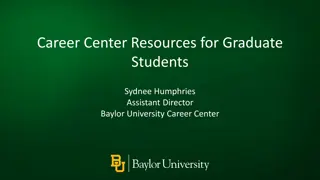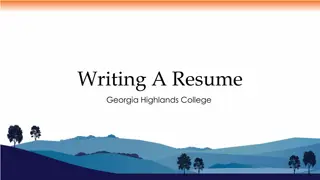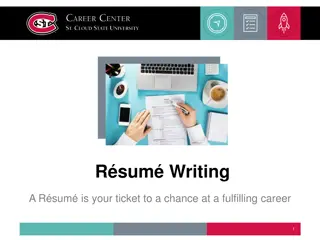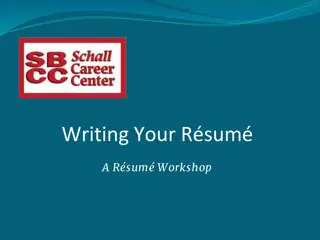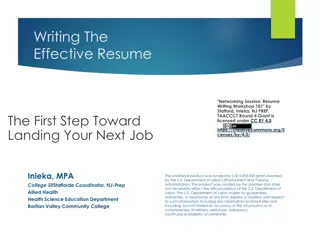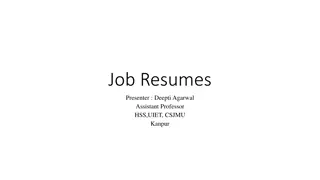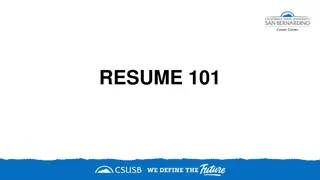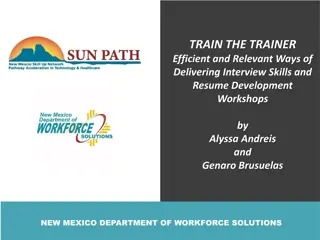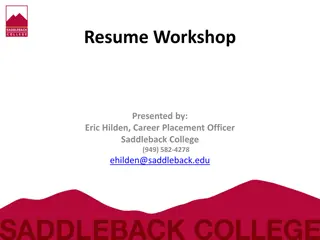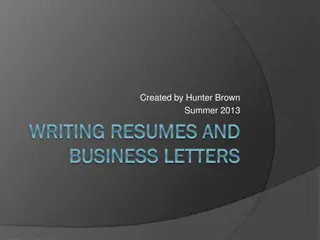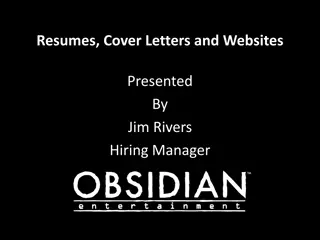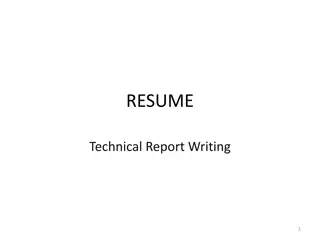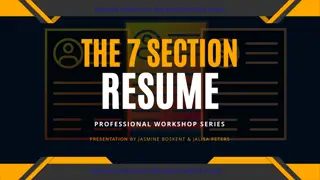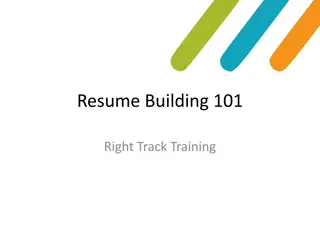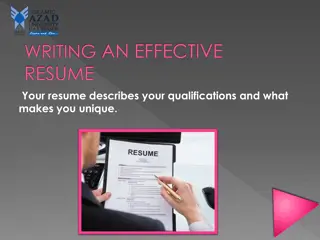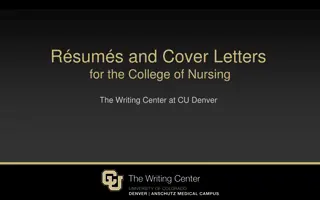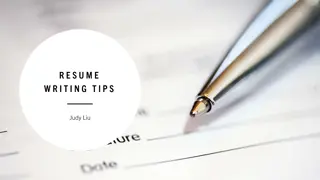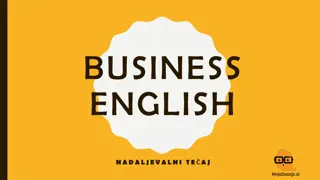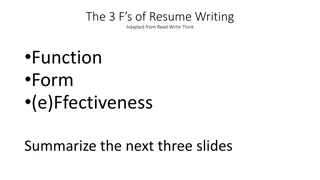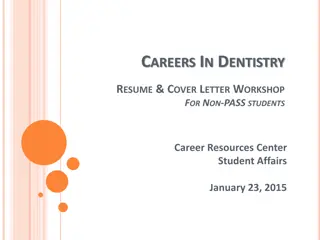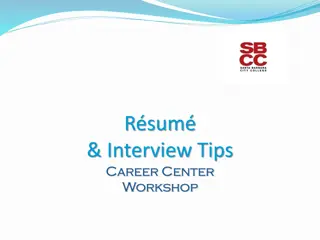Essential Resume Workshop: Crafting an Effective Marketing Tool
Understand the importance of resumes in landing interviews, learn about resume content and styles, and master writing techniques for objective statements and employment skills.
Download Presentation

Please find below an Image/Link to download the presentation.
The content on the website is provided AS IS for your information and personal use only. It may not be sold, licensed, or shared on other websites without obtaining consent from the author. Download presentation by click this link. If you encounter any issues during the download, it is possible that the publisher has removed the file from their server.
E N D
Presentation Transcript
AGENDA Resume & interview tips Resume Workshop
WHAT IS A RESUME? A resume is about knowing who you are and naming it for the employer A resume is a working document that provides a targeted,concise snapshot of why your work skills and abilities will meet the employer s needs A marketing tool for you to the employer so that you can get the interview Preparation tool/study guide for your interview 89% OF HIRING MANAGERS WILL NOT CONSIDER CANDIDATES WHO DO NOT HAVE A RESUME
RESUME CONTENT Include: Personal information Objective Work experience Education Volunteer work Military service Licenses & Certifications
RESUME STYLES Two main styles used are: Chronological Solid, consistent work history Seeking position in your current field Combination Applicants re-entering the work force Students, new graduates, entry-level
RESUME STYLES Chronological Contact Information Objective Statement Work History Action Statements Any formal education Certifications, Licenses and Proficiencies
RESUME STYLES Combination Contact Information Objective Statement List of Relevant Skills Action Statements Chronological Employment History Education Certifications, Licenses and Proficiencies
RESUME WRITING: OBJECTIVE STATEMENT Name what you want Provide proof you can do the job Identify your value to the company Examples: Certified Nursing Assistant utilizing three years experience in hospitals and five years in customer service to serve patients well and help efficiently coordinate patient-doctor needs To obtain a position in the hospitality industry using my four years experience in the restaurant to contribute to the successful reputation of the company and great customer satisfaction
RESUME WRITING: EMPLOYMENT SKILLS Focus on hard skills over soft skills Hard Skills: typing speed, certifications, multilingual Soft Skills: time management, teamwork, communication Use Action Verbs Use correct verb tense (present for current position, past for previous positions) Do not use the same action verb twice within a particular job List a minimum of three to four action statements to describe each job Focus on skills and experiences that relate to the job for which you are applying INTERVIEWERS SPEND ON AVERAGE BETWEEN 6-30 SECONDS READING YOUR RESUME
RESUME WRITING: ACTION STATEMENTS Action Statement Examples Stronger Statements Weaker Statements Shipped boxes Packaged and shipped 30 packages daily via UPS and FedEx resulting in... Processed customer transactions of cash, debit, and credit ensuring... Staffed and managed 25 person department that Rang up customers Managed department
RESUME WRITING: EDUCATION & CERTIFICATIONS Education: Certifications, Licenses, and Proficiencies: List school, location, degree Avoid dates if older than 10-15 years Start with most recent education and work backwards Proficiency with MS Office CNA I CPR Fluent in Spanish ServSafe Certified Others?
RESUME TIPS & TO-DOS Use professional emails Only use quantifiable results Avoid clich s or soft skills Tailor your resume to each job Include keywords and company/job language Focus on the employer Omit references Keep it simple (don t be cute or fancy)
RESUME REVIEW How to use the resume to get the job Recraft resume for this employer Seek job openings Review the job Collect data Learn about the company Write rough draft resume
BEFORE THE INTERVIEW Research Company (e.g., products/services, mission & value statements) Plan your trip (know where you re going, where to park, etc.) & arrive 10-15 minutes early Practice interview questions Get a good night s sleep and don t forget to eat before your appointment Bring copies of your resume, a list of references, and a pen and pad for notes Turn off your cell phone and/or smartwatch Be prepared for either an individual or a panel interview (panel interviews allow more input on hiring decisions) Adapted from information from thebalance.com: https://www.thebalance.com/how-to-prepare-for-a-job-interview-2061361 And careerchoiceguide.com: http://www.careerchoiceguide.com/preparing-for-a-job-interview.html#.WcU01LpFyUk
INTERVIEW DRESS TIPS Dress code will vary depending on industry and employer It is okay to ask recruiters or hiring managers which type of dress is expected from interviewees RCC s Career Closet has free business professional and business casual clothing items available to students Image source: https://business.ecu.edu/careers/first-impressions/
DURING THE INTERVIEW Listen carefully (make eye contact with everybody) Show interest and enthusiasm (lean forward, don t fidget) Give examples of your skills Keep answers positive Avoid rambling Sit up straight with hands in lap (this also helps if you tend to fidget or talk with your hands) Maintain a positive, engaged expression Adapted from information from gcflearnfree.org: https://www.gcflearnfree.org/interviewingskills/what-to-do-during-an-interview/1/ And Investopedia.com: http://www.investopedia.com/financial-edge/0410/7-things-you-should-say-in-an-interview.aspx
INTERVIEW QUESTIONS Typical Questions: Tell me about yourself Include general information about yourself, education, and work history What are your strengths? Share positive and professional attributes What are your weaknesses? Share how you are working to improve weaknesses Why do you want to work here? Focus on the reason why you feel you would be a great fit for the position and/or company Avoid saying I need a job , the pay is great . Where do you see yourself in five years? Keep your response professional Behavioral Questions: What would you do if ? Tell me about a time when How do you handle stress? Tell me about a problem you solved Give an example of how you worked on a team. How would you respond to this situation? Adapted from information from glassdoor.com: https://www.glassdoor.com/blog/common- interview-questions/ Adapted from information from timesunion.com: http://blog.timesunion.com/careers/50- behavioral-based-interview-questions-you-might-be-asked/1538/ Image Source: https://capd.mit.edu/resources/the-star-method-for-behavioral-interviews/
AFTER THE INTERVIEW Ask at least 2-3 questions to your interviewer How long has the job been vacant? How will my performance be evaluated? How would you describe your organization s culture? Ask about next steps after the interview Express interest in job Thank the interviewer(s) in person and send a thank you email or note Avoid asking questions about pay and benefits. This is typically discussed once the job has been offered to you.
RCC CAREER SERVICES We can help with career decision-making, writing resumes and cover letters, job search resources, and interview practice! Visit https://www.randolph.edu/student- success/career-services.aspx or contact the Welcome Center to schedule an appointment! Zip Lesane, Student Services Counselor: zslesane@randolph.edu and 336-633-0369


